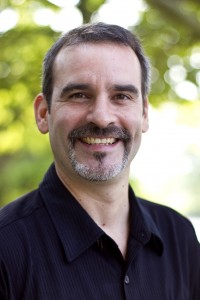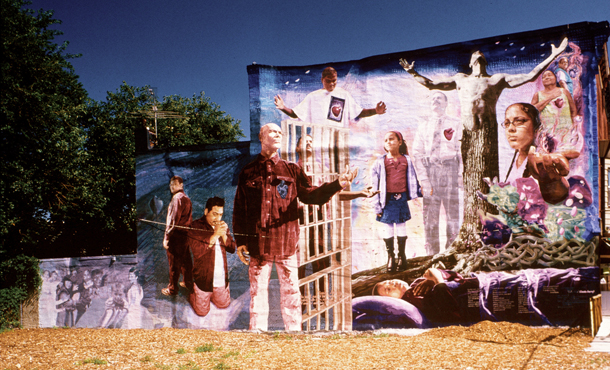In a new approach to promoting peaceful communities, graduate students at Eastern Mennonite University are leading conversation around an award-winning documentary about people who collaborated to paint massive murals in Philadelphia.
A unique twist to the documentary, Concrete, Steel and Paint, is that the painters include men incarcerated in a maximum-security prison as well as crime victims.
The filmmakers, Cindy Burstein and Tony Heriza, consulted with Howard Zehr, distinguished professor of restorative justice at EMU’s Center for Justice and Peacebuilding (CJP), as they prepared to distribute the film. It covers the journey of these artists toward profound insights on the nature of crime – and reconciliation – during their collaboration, and explores how the criminal justice system affects everyone involved in the project.
After its 2009 release, Concrete, Steel and Paint found a wide audience within restorative justice circles. In 2012, Burstein and Heriza began working with CJP to use the film as a starting point for dialogue about using restorative practices to effect change on the wider social level that their film explores.
“Embedding our restorative justice work in peacebuilding is one of our unique niches,” said CJP professor Carl Stauffer, co-director of EMU’s Zehr Institute for Restorative Justice.

While restorative justice is often conceptualized on the personal level between individual victims and offenders, Stauffer said that CJP is equally interested in broader use of restorative practices to address violence caused by large structures like the criminal justice system.
Sarah Roth Shank and Jonathan Swartz, both master’s students at CJP, and two other classmates have led dialogues at several events where the film was shown, including the 2013 National Conference on Restorative Justice in Toledo, Ohio. Future students will have opportunity to continue leading similar dialogues around the film, both for practical facilitation experience and to explore the use of restorative practices to confront systemic injustice, Stauffer said.
The filmmakers’ enthusiasm for these dialogues began after they worked with Zehr to lead one at the Concrete, Steel and Paint premiere in Philadelphia. After seeing hundreds of strangers erupt into conversation with one another after the screening, they were inspired to continue exploring how their film could continue to spark conversation among and between crime victims, criminal justice reform advocates and other stakeholders, as well as motivate them into action.
CJP has incorporated the role of media and social change through dialogue into its curriculum. At its annual Summer Peacebuilding Institute (SPI) in 2014, two courses co-taught by EMU professors and graduates of CJP will relate directly to these themes.
- “Media for Societal Transformation,” co-led by a veteran filmmaker on faculty, Paulette Moore, and Danielle Taylor, MA ’13, will be held during SPI’s first session, May 5-13, 2014.
- “The Impact of Social Issues of Restorative Justice” will be co-led by Stauffer and Jacqueline Roebuck Sakho, MA ’09, during the second SPI session, May 15-23, 2014. (Read more about Sakho’s restorative justice work here.)
In 2015, SPI will hold an intensive, three-week media camp for more advanced training in using film and social media for peacebuilding.
“Developing media and advocacy skills is important, because we know that documenting structural problems is key to changing the system,” said Jayne Docherty, CJP program director.
Stauffer said that CJP encourages people to think systemically, asking the key question, “What would it be like to make a whole system more aligned to restorative values and process?”
More information on these and other courses at SPI can be found on its website.

Our UCC church is doing a study of reiterative justice and i am interesting in the film. Is there a way to view it online or purchase it?
Thanks for the comment, Lois.
We will let you know as soon as we can.